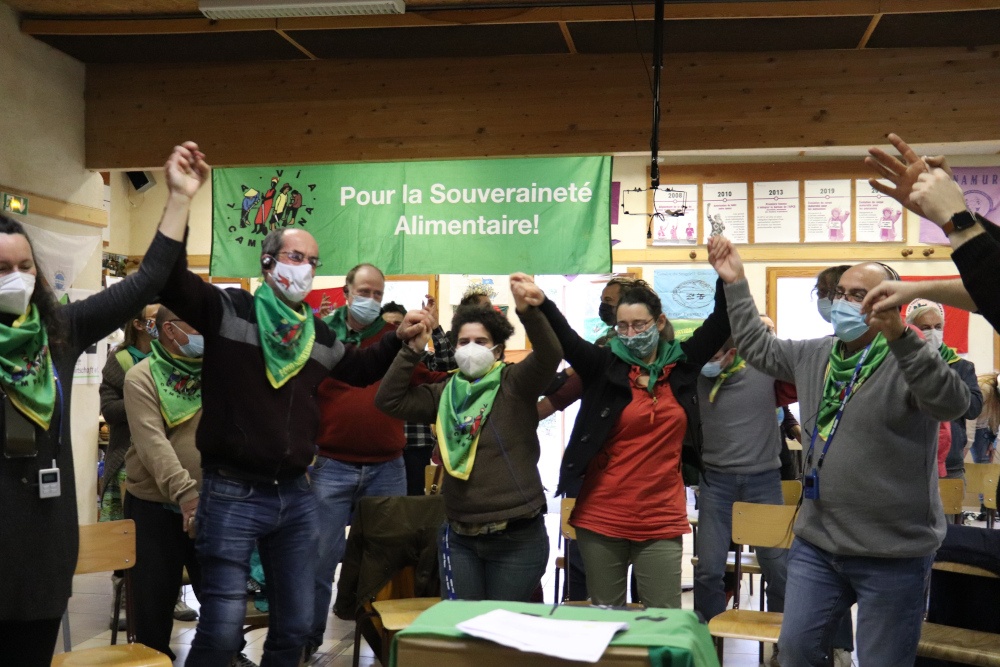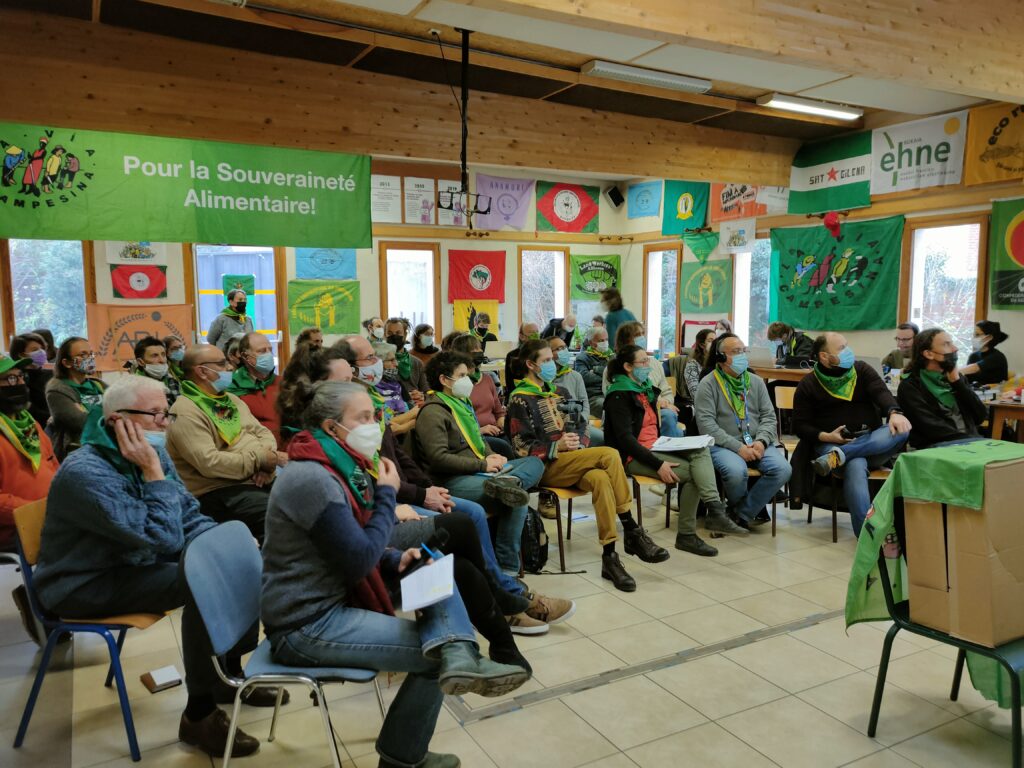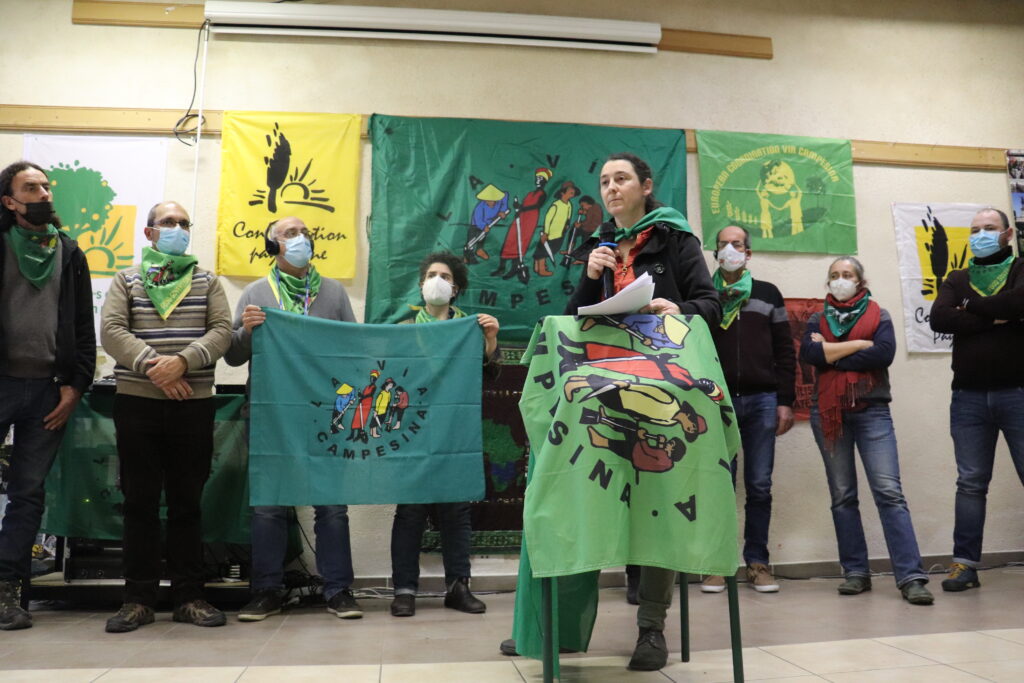On 30th November, La Via Campesina’s International Operative Secretariat (IOS) officially moved to Bagnolet, France, to be hosted by Confederation Paysanne on behalf of the European Coordination Via Campesina (ECVC), the regional arm of LVC.
This move keeps up with the global movement’s tradition of rotating its IOS every few years. Founded in 1993, La Via Campesina (LVC) – the international movement of peasants now comprising 182 member organizations in 81 countries – has had its IOS located at Brussels (1993-1996), Tegucigalpa, Honduras (1996-2005), Jakarta (2005-2013) and Harare (2013 – 2021).

With this move to Europe, the global movement has completed the first full circle of its rotation, bringing a rich history of peasant mobilizations, struggles, and victories. Over the three decades, La Via Campesina has worked with allies and unions worldwide to build a collective vision, plan and platform to bring food sovereignty to all territories. The movement’s insistence on Agrarian Reform, Social Peace and Peasant Feminism as an essential pre-condition to achieve this goal now finds resonance among all progressive societies. The transition to Europe allows the movement to bring this rich history and experiences right to the doors of global governance institutions based in this continent.
Morgan Ody, a small-scale vegetable grower from Brittany, France, was named the General Coordinator of La Via Campesina, previously held by Elizabeth Mpofu of ZIMSOFF, Zimbabwe (2013-2021). Morgan is also a dynamic leader of Confederation Paysanne, La Via Campesina’s member organization in France. She is also a member of the International Coordination Committee of LVC (representing Europe), and a key leader of the European Coordination Via Campesina (the regional arm of LVC in Europe).
The International Operative Secretariat (IOS) in Europe will continue to take its mandate from the International Coordination Committee (ICC) of La Via Campesina. The ICC is a collective of 22 elected peasant and indigenous leaders from Asia, Africa, Europe and the Americas and receives its mandate from the International Conference that La Via Campesina holds every four years.
VOICES FROM THE TRANSITION CEREMONY
Several members from the European Coordination of La Via Campesina, including Confederation Paysanne, took part in this ceremony that witnessed “virtual” participation from Asia, Africa and the Americas.

After a warm welcome from Nicolas Girod of Confédération Paysanne, several peasant leaders also delivered speeches to mark this historical moment. Paul Nicholson, a founding member of La Via Campesina, gave testimonies of the movement’s first years and its first steps in Mons and Brussels. He elaborated on the building blocks that went into making a global movement. He emphasized the importance of solidarity between peasant and small-scale food producers in all the world’s regions, which characterizes La Via Campesina.
Rafael Alegria, also a previous General Coordinator and among the founding leaders of LVC, reminded the attendees about the big mobilizations that defined LVC during its eight years in Honduras (1996-2005). He recalled the marches in Seattle (1999) and Cancun (2003) that exposed the devastating impacts of a free-market economy.
“La Via Campesina at that time transcended from what was purely a trade union struggle to a broader and diverse movement of rural struggles with political demands and viable alternatives. Those mobilizations helped a lot to expand and strengthen a large global movement of peasants, women, youth, small farmers, in the struggle for biodiversity, agrarian reform, Food Sovereignty and agroecological peasant agriculture.”
Henry Saragih (SPI, Jakarta) General Coordinator from 2004-2013 recalled the successful negotiations and mobilizations that led to the adoption in 2018 of the UN Declaration on Rights of Peasants and Other People Working in Rural Areas.
“It was in this period that a ‘Peasants Rights Charter’, first developed by Serikat Petani Indonesia (SPI) and then adopted by the South East Asia Region was brought to a conference of La Via Campesina. From this point on, the process of bringing it to the UN and the negotiations began, right until the historic adoption of the UNDROP in 2018” added Henry, who also reminded of the great mobilisations carried out by LVC against WTO in Hong Kong.
Elizabeth Mpofu, General Coordinator from 2013 until now, also spoke about the period that the secretariat in Harare. She recalled the crucial steps in building regional secretariats of La Via Campesina in every continent.
She also emphasised how the last decade brought peasant women to the spotlight.
“As a movement, we have achieved a lot. Allow me to highlight the centrality of women peasants in LVC. In 2013, LVC nominated a woman as its General Coordinator for the first time. Without over amplifying the impact of this symbolic decision, I believe that many women’s conditions, particularly participation in decision-making, were changed for the better, either in organizations, communities, or their families. The women and youth of LVC have grown in strength and continue to shape their struggles, participation and representation within the movement.”
Elizabeth also warned of the growing challenges confronting rural societies. The COVID pandemic, vaccine inequity, economic inequality, worsening climate crises found mentioned in her speech. She also pointed to the growing consolidation between agribusiness and big tech companies. “They are pushing a form of digitalization that further marginalizes peasant communities,” Elizabeth said while calling for an organized response to these challenges.
Hortense Kinkodila Tombo – one of the current members of the ICC – pointed out that IOS was moving from her region to Europe, the heart of imperial, colonial and agribusiness interests. “We will continue and extend the work on one of the major global struggles of our time, rural exodus and migration. This struggle is strongly intertwined with one of the peasant movement major claims, namely agrarian reform and access to land.
“Young people have no access to land and are forced to migrate towards North, especially to Europe. A neo-colonial politics has ensured that they have nothing to do here; they are looking for better living conditions and end their journey in the oceans.”
Moayyard, Coordinator of La Via Campesina Arab and North Africa (ArNA) region, raised similar concerns, speaking from the office of the Union for Agricultural Workers’ Committee (UAWC) in besieged Palestine. He highlighted the forced displacements due to the wars and internal conflicts and the impact of a geopolitical imperial war on peasant families.
“Most of the region’s governments work with the likes of the World Bank to advance a neoliberal agenda that only serves to the interests of the elites. LVC, with its secretariat now in Europe, can take our voices directly to the doorsteps of wealthy and powerful governments and the global institutions”, he added.
Pramesh Pokharel, the ICC youth member from Asia, singled out internationalized and institutionalized corporate capitalism as a significant challenge confronting peasants. He recalled how free-trade policies pushed through WTO and otherwise have impacted peasant communities in Asia.
“Most of these international institutions have their seat in Europe. LVC must use this opportunity to defend our rights as elaborated under UNDROP and call for a trading system built on solidarity, cooperation, and local markets. I also think that European farmers have an important role to play against the myths and false solutions of industrial agriculture, corporate monopoly, Climate Smart Agriculture and GMO Seeds.”
Morgan Ody, the new General Coordinator gave a powerful speech while welcoming the new secretariat. She spoke about La Via Campesina’s grassroots local and global struggles, the many faces neoliberalism, imperialism and patriarchy are taking to crush the peasants who still feed 70% of the world population.
“We see it everywhere: capitalism, as an economic system based on the exploitation and concentration of capital; capitalism based on the commodification of the world and the monopolization of more and more wealth; capitalism as a system of destruction of the peasantry,” she said while citing examples from France of how techno-capitalism marginalizes European peasants.

“We are resisting! In each of our organizations’ struggles, two dimensions come together: the defence of our survival as workers and of the common good. At the international level, in the same way, we have come together as La Via Campesina with a collective objective to defend the continued autonomous and decentralized production of food so that all humans on earth have access to a dignified life. What are our main lines to reach this goal? Peasant rights, agrarian reform, food sovereignty.” [Download Morgan’s full speech]
The ceremony ended joyfully and on a celebratory note, with attending farmers dancing to a live concert by well-known french singer and band HK et Les Saltimbanques. They sang an original anthem called «Paysannes, Paysans» followed by his famous demonstration’s hit «On lâche rien» (we won’t give anything up).
In the end, the delegations present in France also led a rally in solidarity with India’s protesting farmers near the Indian embassy. India’s protesting farmers, out on the streets for more than a year, have successfully forced their government to repeal three controversial laws that threatened to corporatize the Indian agricultural scene. It is an example of how organized people’s resistance can result in substantial changes even in the face of adversities. Uniterre, a member of La Via Campesina in Switzerland also held a demonstration outside the WTO Ministerial Meeting venue in Geneva, on the same day, to echo La Via Campesina’s long standing demand to keep agriculture out of free-trade negotiations.
This post is also available in Français.

